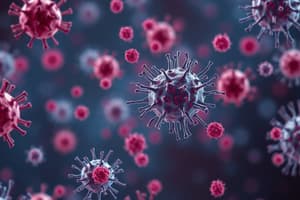Podcast
Questions and Answers
Where do B cells originate and mature?
Where do B cells originate and mature?
- Thymus
- Bone marrow (correct)
- Spleen
- Lymph nodes
What is the primary site of maturation for T cells?
What is the primary site of maturation for T cells?
- Lymph nodes
- Thymus (correct)
- Spleen
- Bone marrow
What is the primary driver of innate immunity?
What is the primary driver of innate immunity?
- B cells
- Antibodies
- T cells
- Phagocytes (correct)
What do T cells have as receptors?
What do T cells have as receptors?
What is the subclass of cytokines that attract circulating immune cells to the site of injury?
What is the subclass of cytokines that attract circulating immune cells to the site of injury?
What is the ability of a pathogen to enter host cells or tissues, multiply, spread, and cause disease called?
What is the ability of a pathogen to enter host cells or tissues, multiply, spread, and cause disease called?
Which of the following is true about Toll-like receptors?
Which of the following is true about Toll-like receptors?
What is the function of NFκB in phagocyte signal transduction?
What is the function of NFκB in phagocyte signal transduction?
What is the role of phagolysosomes in phagocytosis?
What is the role of phagolysosomes in phagocytosis?
What can some pathogens do to survive within phagocytes?
What can some pathogens do to survive within phagocytes?
What is the effect of a systemic inflammation?
What is the effect of a systemic inflammation?
How does the complement system contribute to the immune response?
How does the complement system contribute to the immune response?
Which antibody is the most common circulating in the body?
Which antibody is the most common circulating in the body?
What determines the immunogenicity of antigens?
What determines the immunogenicity of antigens?
How do B cells produce antibodies?
How do B cells produce antibodies?
What is the function of the Fc stem of IgG?
What is the function of the Fc stem of IgG?
What is the purpose of memory cells in secondary antibody responses?
What is the purpose of memory cells in secondary antibody responses?
How are antigens presented to T cells?
How are antigens presented to T cells?
What determines whether a large oral dose of an immunogen induces tolerance or immunity?
What determines whether a large oral dose of an immunogen induces tolerance or immunity?
Which cells recognize cells without Major Histocompatibility Complex I (MHC1) proteins and induce apoptosis through granzyme and perforin release?
Which cells recognize cells without Major Histocompatibility Complex I (MHC1) proteins and induce apoptosis through granzyme and perforin release?
What is the outcome of continuous exposure to an antigen?
What is the outcome of continuous exposure to an antigen?
What is the role of interferons in preventing viral replication?
What is the role of interferons in preventing viral replication?
Which cells are involved in producing antibodies in adaptive immunity?
Which cells are involved in producing antibodies in adaptive immunity?
What is the purpose of T cell selection in the thymus?
What is the purpose of T cell selection in the thymus?
What is the function of memory cells in the immune system?
What is the function of memory cells in the immune system?
Flashcards are hidden until you start studying
Study Notes
Lecture 19 – Adaptive Immunity: Key Concepts
- The alternative pathway of complement activation leads to three outcomes: Complement C3b coating the target, C3a diffusing as a chemoattractant, and C5a binding to the target forming the membrane attack complex.
- Natural killer cells recognize cells without Major Histocompatibility Complex I (MHC1) proteins, inducing apoptosis through granzyme and perforin release.
- Interferons, produced by virally infected cells, prevent viral replication by stimulating antiviral protein production in uninfected cells.
- Adaptive immunity involves B and T lymphocytes, with B cells producing antibodies and T cells defending against intracellular pathogens.
- Lymphocyte receptors interact with individual antigens, with T cells displaying antigen-specific T cell receptors and B cells displaying membrane-bound immunoglobulins.
- Memory cells are formed upon first antigen exposure, leading to rapid and strong responses upon subsequent exposures.
- The primary immune response involves B and T cell activation, proliferation, and differentiation upon first antigen exposure.
- Continuous exposure to an antigen does not result in a secondary immune response, requiring a refractory period for memory cell formation.
- Secondary immune responses, resulting in a stronger and faster reaction, are activated upon subsequent exposure to the same antigen.
- Tolerance is the acquired ability to discriminate between self and foreign antigens, with failure leading to autoimmunity.
- T cell selection involves positive and negative selection in the thymus, with clonal deletions eliminating most T cells that enter.
- B cell selection involves positive selection upon encountering an antigen, leading to proliferation and differentiation, and negative selection in the bone marrow to delete self-reactive B cells.
Studying That Suits You
Use AI to generate personalized quizzes and flashcards to suit your learning preferences.



